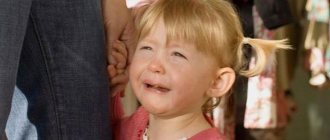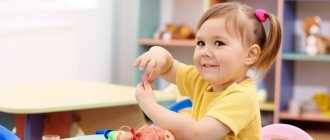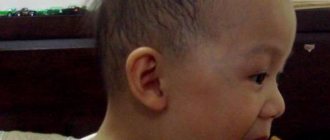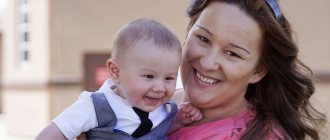- home
- Speech development
Speech development specialists do not give clear deadlines for when a child should speak at 2 years old. There are only approximate guidelines for standards that parents and teachers can rely on. Parents' concerns are understandable. However, if a child does not speak at 2 years old, Komarovsky believes that this is not a reason to diagnose him and is unnecessarily worried.
Stages and norms of speech development
Since speech is important not only for full communication, but also has an impact on the mental development of the child (associated with the development of memory, attention, thinking and imagination), it is worth paying close attention to delayed speech development.
Knowledge of the stages and norms of speech formation helps to identify such violations.
It is important to remember that the norm is a relative concept, and each child has individual capabilities and characteristics; the time of appearance of certain speech forms may vary in terms of timing.
Main stages of development:
- From birth to the 1st month of life, the baby reacts to the intonation of speech addressed to him (shows joyful animation, cries). At this time, the first vocal reaction appears - the child screams, and by the second or third month the scream has a variety of intonations.
- From the 2nd to 3rd month, humming is observed - the toddler makes individual melodious sounds and listens carefully. These sounds are the same for children of any nationality: a-a-a, o-o-o, gu-u-u, mmm. By the 4th month, the combinations become more complex, and the baby gradually weeds out combinations of sounds that are unusual in his native language.
- From 4 to 5 months, humming turns into babbling - the baby reproduces combinations of syllables, imitating the speech of others. After the 6th month, babbling sounds accumulate intensively and gradually turn into babbling words. Important: in case of delayed speech development, babbling appears at a later age, and if there are problems with hearing, the humming stops.
- From 6 to 10 months, “quantity turns into quality” - the baby repeatedly repeats the same babbling chains of sounds, babbling words also appear that are correlated with specific objects and persons (“bi-bi”, “av-av” etc.). Speech is distinguished by emotional expressiveness, there is a reaction to one’s name. The baby begins to correlate the sound image of the word with the object, responds to questions (shows the named object, looks in its direction).
- From 10 months to a year, sentence words appear (a word expresses a feeling, desire, or designates an object, depending on the situation).
- From 1 to 3 years, the pace of speech development in a child actively exploring the world accelerates. The child is interested in the names of new items and objects and actively uses new words. There are sound distortions, syllables are rearranged, and hard-to-pronounce sounds are missed. Often only the initial syllables are used.
It is important - normally, a child of the second year of life is able to easily pronounce the sounds o, n, t', d', t, d, k, g, x, v, f, and closer to the 3rd year also th, l', uh, s'.
Elementary phrasal speech is formed by the age of 2 - the baby is able to combine several simple words in the process of communication (give me a drink, etc.).
At one and a half years old, a child's vocabulary is approximately 100 words, at the age of two years - about 300, and by the end of early childhood - approximately 1500 words.
Correct use of grammatical categories begins in children after 2.5 years.
Deviations from the norm
Minor deviations from the deadlines while maintaining the stages of speech development usually indicate an individual peculiarity of the toddler. It should be remembered that girls usually begin to speak earlier than boys and like to imitate adults more. The stronger sex is more action-oriented; boys often use their first words to indicate actions, and sometimes they do not want to repeat after adults.
We recommend: Daily questions for your baby
If a child does not speak at 2 years old, but differs little from his peers and perfectly understands what adults want from him, there is no need to worry too much. Sometimes active speech appears suddenly, and yesterday’s silent child, with due attention from adults, turns out to be a completely talkative child.
In case of concern, parents should determine the cause of the baby’s silence by excluding possible pathology. For this purpose, you need to contact a pediatrician, the doctor will give referrals to a speech therapist and other specialized children's specialists (ENT, neurologist, psychiatrist).
Why a child does not speak by the age of 2: reasons according to Komarovsky
There is no need to worry too much if by the age of 2 the child still does not speak. This situation does not necessarily lead to big problems. It may also turn out that there is no reason to raise the alarm and drag the baby to the doctors. Komarovsky identifies the following reasons for the “silence” of a two-year-old child.
- Problems in the functioning of the hearing organs. It is not difficult to identify this cause, because with hearing damage, the child will not even understand speech.
- Pronounced heredity. A child often does not speak by the age of 2, because he received “silence” from his parents. If the situation persists until the age of 3, then it is worth showing the child to a specialist.
- Weakness of the body. A variety of phenomena lead to the fact that a child lags behind in development. The delay in the maturation of the central nervous system is compensated over time.
- Psychological trauma. According to Komarovsky, sometimes children do not speak until they are 2 years old because they suffered a severe fright at an early age.
- Overprotection on the part of adults. Children may not talk for a very long time if they simply have no reason to do so. A child whose wishes are immediately guessed does not need to voice them.
As you can see, in most cases, the lack of speech in a child of 2 years is a completely safe phenomenon. But still, sometimes it is impossible to do without special measures. Komarovsky talks about certain methods of intervention to stimulate the baby to start talking. It is useful to consider them.
Why doesn't a two-year-old child speak?
All children who do not speak at the age of two can be divided into two groups:
- Absolutely healthy babies who “remain silent” due to temperament and other individual developmental characteristics.
- Children with various pathologies that impede normal speech development.
Often, in the absence of health problems, a 2-year-old child does not speak in the following situations:
- Speech is not needed. This situation occurs both in children left to their own devices and in children suffering from overprotection. The little ones remain silent for a long time, for various reasons they do not receive full communication with their parents - they have neither an example to follow nor an incentive to develop speech. Adults who are excessively fussing over the child, practically guessing the child’s wishes and immediately rushing to fulfill them, stimulate prolonged silence (usually such children have a limited set of words that allow them to manipulate others). Children who are overprotected have no need to voice their desires and feelings; they get by just fine with gestures.
- There are stressful situations and fear. Healthy children who are in an emotionally dysfunctional environment become withdrawn and silent due to strong stressful experiences (primarily, regular family scandals have a stressful effect on the child). A child at this age can be negatively affected by moving, a serious illness requiring hospital treatment, improper adaptation to kindergarten, etc. Children of this age perceive separation from their mother especially acutely.
- There is bilingualism in the family. Although children learn a variety of languages much more easily than adults, regularly using different names for the same objects makes it difficult for a child to accurately determine which names to use.
- The child has a negative attitude towards speech. Usually, children with a stubborn, independent character are stubbornly silent and do not respond to requests to say or repeat anything. And the more the parents insist, the more withdrawn and silent the child becomes.
- The child has unlimited access to a TV, computer, etc. - in this case, he often perceives speech as background noise, without distinguishing the parental voices from the stream of sounds.
Pathologies causing delayed speech development
In addition to the above socio-psychological factors, there are also medical reasons. Such reasons include:
- Hearing impairment. Hearing is the leading speech analyzer, and various problems with it lead to speech disorders in children. A child who has been deaf since birth is unable to master speech on his own. In children with hearing loss, due to the inferiority of speech perception, its understanding and reproduction suffers.
- Limited mobility of the speech organs, which occurs in case of damage to the nervous system (dysarthria) in children. Appears due to injuries, cerebrovascular accidents, neuroinfections, etc. It is often one of the manifestations of cerebral palsy. Depending on the severity of the pathology, children's speech is characterized by minor articulation disorders or is practically absent.
- Congenital anomalies of the development of the maxillofacial region, complicating the development of speech in children.
- Hereditary diseases (familial bradyllia, myasthenia gravis, Down syndrome, etc.).
- Pathologies of the brain and nervous system. With organic lesions of the cortical speech centers located in the brain (can be intrauterine or occur during the first years of life), alalia develops; in this case, the baby’s speech reactions appear late, the vocabulary is poor, the syllable structure and sound pronunciation are impaired. Local organic brain damage leads to the development of aphasia in children; in this case, previously acquired speech skills are lost.
A fairly common reason that explains a child’s silence in the absence of physical pathologies is autism. This is a disorder of the development of the nervous system, expressed in isolation, weak expression of emotions and active avoidance of the outside world. A slight delay in speech development is also observed in the case of autism-like Asperger's syndrome.
Predisposing factors to the fact that the baby does not speak by the end of 2 years of life are:
- long-term toxicosis, maternal illnesses during pregnancy;
- too long/quick labor;
- fetal hypoxia;
- birth injuries in children;
- taking contraindicated medications by the mother during pregnancy.
Helping your child develop speech skills
When the cause of a child’s prolonged silence is any pathology, the development of speech should be accompanied by treatment of the underlying disease. Drug/surgical therapy for children is prescribed by doctors of a narrow specialty - neurologist, psychiatrist, ENT specialist.
Activation of the activity of the child’s speech zones is facilitated by cortexin and other drugs, magnetic therapy, and, in the absence of contraindications, electroreflexotherapy.
Classes are held with a defectologist to help individually prevent the development of new deviations and correct existing ones.
Speech therapy massage is also recommended for children who speak poorly.
To develop speech skills, sick and completely healthy silent children need regular “conversational” classes with parents, including:
- Articulation gymnastics.
- A variety of activities that develop fine motor skills (sculpting, finger games, pouring and sorting small objects, etc.), they stimulate the speech center.
- Slow, expressive reading (rhythmic speech is easier for children to perceive, give preference to children's poems), stories based on pictures.
- Joint singing of children's songs, games with imitation of animal voices, etc. (the baby remembers what you said together faster).
If, if the child has disorders, the parents’ actions are corrected by a specialist, then what to do and how to get a child who does not suffer from any pathologies to talk?
First of all, the baby needs to create conditions that stimulate verbal communication. Parents should give up guessing the baby’s wishes, so that he is forced to formulate the request in words (ask the baby - “tell me what you want, I don’t understand”). You need to visit playgrounds more often or send your child to kindergarten; in a group of peers, the baby will not be able to communicate exclusively with gestures and will begin to talk faster. New interesting experiences that the baby will want to share with others will also be useful.
If a stubborn, independent child understands but does not repeat your words, do not insist, otherwise he will begin to resist what is being “imposed” even more. Try to create a situation in which he wants to speak out on his own.
Exercises that promote speech development are also recommended for a completely healthy child.
Give the baby a speech
Everyone wants to know what to do, even if a child at 2 years old does not speak due to not very alarming reasons. Following these rules will help your beloved child “talk.”
Surround your baby with attention
A little person should feel his importance, feel love from his parents, because for him they are the center of the world. The desire of mom and dad to communicate is the best incentive for trying to talk. But be careful not to violate the fine line between guardianship and overprotection.
Try to have a dialogue
To paraphrase a well-known proverb about appetite, we can say: the desire to participate in a conversation appears in the process of conversation. Descriptions of surrounding objects, nature, weather, behavior of people and animals encourage the child to express his view of things.
Read picture books
Fairy tales with large, bright drawings will definitely interest your child. Don't forget about the second component: in addition to reading the text, you need to describe the pictures. At the same time, it is worth creating an environment conducive to conversation.
Play educational games
Use your imagination to make your child want to comment on his actions. With this problem, it is best to choose exercises to develop fine motor skills of the hands, as well as games during which you need to show imagination and attention.
Encourage your baby and remain calm
The child should notice: when he tries to speak, mom and dad are happy, and this way you can earn praise. This will increase the desire to remember and pronounce phrases. Remember, the mood of the parents is reflected in the behavior of their heirs. Replace irritability and worries due to speech delays with confidence that nothing bad is happening, and the emotional state of the growing toddler will also improve, which, of course, contributes to development.
Old-school pediatricians are accustomed to placing children’s development within strictly established frameworks. They argue that limiting the speech of 2-year-old children to slurred sounds is a reason for an urgent examination, and are often inclined to quickly make a diagnosis of “mental retardation.” But many doctors are not so categorical, because modern medicine recognizes the presence of a huge number of individual human characteristics. Such specialists include Dr. Komarovsky.
Normal speech development of a child
What time does a baby start talking? In the first months of life, the child has no speech. The baby shows a desire to communicate by smiling and crying. By the second month, the baby begins to buzz. This stage of development is very important. Walking allows you to prepare and develop the muscles of the articulation organs.
By 7-9 months of age, the baby begins to babble. Syllables appear in speech that do not carry awareness. The child simply mutters ba-ba-ba, ma-ma-ma and other sets of letters. At 9-11 months, he already understands well the conversation and intonation of others. Knows about 50-100 words by ear. At 11-14 months of age, the baby begins to pronounce words. The vocabulary already contains the following words: “mom”, “dad”, “woman”, “uncle”, “woof-woof” (dog), “bo-bo” (hurt), “bi-bi” (car) and other. There should be 10 words by the year.
A one-year-old child carefully follows the movements of his relatives’ lips during a conversation and tries to repeat the words and articulation of adults. If you constantly talk to your baby, he will quickly learn to repeat words and reproduce them correctly.
Girls begin to speak 2-4 months earlier than boys. This occurs due to differences in brain structure. In boys, the connection between the hemispheres is less developed, which slightly complicates the conduction of nerve impulses. Therefore, boys start talking a little later, which is the norm.
At one and a half years old, the child is already forming two-word phrases. He says in an imperative mood: “Dad. Give”, “Mom. Go." By 18 months of age, he pronounces words in the plural.
By the age of two, a child already knows about 1000 words. At this age, children begin to ask questions: “What is this?”, “Who is there?”, “Why?” In a 2-year-old child, you can hear small sentences: “This is a dog,” “This is a chair,” “Give me a bear,” “Where is daddy?”











